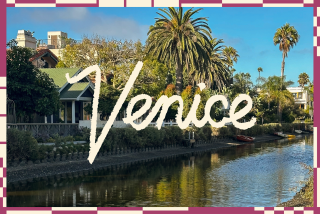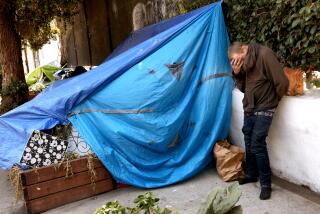A Class Struggle on Venice Boardwalk
It started about the time a dog named Raku voted in Venice’s neighborhood council election.
Then, it got weirder.
As the volunteer council debated how far the funky seaside community should go to retain its bohemian character as housing costs soared, liberal council members were attacked as “Stalinists,” while other residents were targeted with signs that urged: “Yuppies go home.”
The feuding became so heated that a council member once delivered paper towels soaked in urine to a homeless activist on the boardwalk.
To tourists from around the world, Venice is its colorful boardwalk, bustling with surfers, roller-bladers, fire breathers, sidewalk painters, hemp tattoo artists, gang members with pit bulls and sunbathers in skimpy suits.
But to its residents, it’s also a neighborhood of million-dollar homes, bungalows on tiny lots and low-rent apartments.
For a year, the Grassroots Venice Neighborhood Council has been deeply riven over how best to preserve the storied Los Angeles community of movie stars, artists, black and Latino families and street people.
Members who have billed themselves as “the progressive slate” control the council. Their agenda is ambitious and controversial: stop gentrification, build more low-income housing and help the homeless.
“It’s property values versus human values,” said Emily Winters, a member of the council’s progressive slate. “The opposition has openly stated that they want gentrification, and they want their property values to go up, and they want to destroy us.”
A soft-spoken painter, Winters said she moved to Venice in the 1960s when “everybody was poor and there was a lot of camaraderie.”
The other side believes that a radical fringe has put out a welcome mat for people who live on the streets and in their vehicles, worsening parking and sanitation problems in the already overcrowded area.
“They want to take Venice back to 1967,” said Kelley Willis, a long-haired software engineer who was just voted off the council. Willis says that he agrees Venice should be kept quirky and affordable, but that what the progressives want is unreasonable.
“They spend all their time on the homeless or the poor tenants,” he said. “Everybody else, whether they are a homeowner or a businessman, can just go hang. That’s no way to try to be the voice of the community.”
After a contentious battle over the council’s June 27 election, city officials cut off the panel’s funding earlier this month, thrusting it into a bureaucratic netherworld that one resident likened to “the night of the living dead.”
The council is one of 80 that have formed in the last two years across Los Angeles to advise City Hall on neighborhood issues and spend up to $50,000 a year on projects, such as festivals and planting trees.
Many have diligently thrown themselves into these neighborhood projects. But others, like the Venice council, have become forums that allow long-simmering tensions to explode into the open.
“What you’re seeing is Venice being Venice,” said Greg Nelson, general manager of the city’s Department of Neighborhood Empowerment. “Venice has always been a community divided.”
Sandy Kievman, field deputy for Councilwoman Cindy Miscikowski, whose district includes Venice, has been monitoring the dispute but has not officially intervened.
“If you get three people in a room in Venice,” she said, “you’re going to get three very passionate opinions.”
Founded at the turn of the century by Abbot Kinney, an eccentric asthmatic who wanted to re-create Venice, Italy, the community has always stood apart from the rest of Los Angeles. With its beach and carnival-like boardwalk, it has also long been a draw for tourists.
In Kinney’s time, Venice was its own city, with kitschy amusement piers and man-made canals plied by gondolas.
Annexed by Los Angeles in 1925, the area fell into disrepair, and many of its whimsical canals were drained and filled.
In the 1950s, beatniks flocked to the area, drawn by low rents and funky streets. Hippies followed in the next decade, throwing wild parties during the famous Summer of Love. Musicians and artists came too, cementing Venice’s reputation as an artistic haven where free expression reigned.
But the fog-kissed streets just east of the beach were also considered a somewhat dangerous part of town. In the 1970s, some called it “Appalachia by the sea.” In the 1980s and 1990s, gang violence raged in the gritty Oakwood neighborhood. Then came the real estate boom of the late 1990s. Along the canals, home prices sailed past the $1-million mark several years ago. Fancy boutiques and chichi restaurants followed. And in 2002, one of the world’s most famous movie stars, Julia Roberts, bought a home on a quaint bougainvillea-draped street.
All that change worried those who cherished the community’s mix of races and economic levels. Their fears are not unfounded: The clerk at the local elementary school, Westminster, said enrollment was dropping as children whose families had rented in the area were forced out.
A year ago, a group of left-leaning activists took notice of the fledgling neighborhood council. They put together a slate, organized a massive absentee ballot campaign and won a majority of the seats.
Almost immediately, things went to the dogs. Or rather, to one dog, Raku, a wiggly black Labrador belonging to Marta Evry. Evry was running for the board against one of the progressive slate members. Upset that absentee rules seemed lax, Evry filled out a ballot in Raku’s name and then denounced the procedures as unfair because her dog was able to vote. Other losing candidates also filed election challenges. City officials and the League of Women Voters, which ran the election, ruled against them. Since then, the progressives have run the council.
They have pursued a broad liberal agenda, but their efforts on behalf of the homeless have produced the most sparks.
Peggy Lee Kennedy, chairwoman of the poverty and homeless committee, said her aim was merely to secure “basic services and human rights” for all homeless people.
Kennedy is working to designate places in Venice where the homeless can legally camp or sleep in their cars without “getting harassed by the police.” And her committee has pushed to oppose a city law that banned public defecation and urination, and has tried to educate homeless people ticketed by the police about their rights. To many, it seems as if Kennedy, who says her car tire has been slashed and her food-distribution van stolen, were encouraging the homeless to move to Venice, a charge she denies.
“Free campers literally living outside my front door, having to deal with human excrement and trash and loss of parking in an area where there is not enough parking. I am just disgusted by the behavior of the neighborhood council,” fumed Mark Ryavec, a former executive director of the Venice Boardwalk Assn., a business group.
To understand just how rancorous the debate has become, consider how Bonnie Cheeseman, a teacher, reacted this spring when she looked out her apartment window and saw a man urinating on her building.
When she rushed outside to stop him, she said, she saw that Venice activist Gina Record had put fliers throughout her neighborhood calling Cheeseman anti-homeless. At the time, Cheeseman was a council member and had spoken in favor of outlawing public urination and defecation.
“I went ballistic,” she said. “I sopped up the urine in paper towels, and I put it in a plastic bag and took it down to the boardwalk.”
There she confronted Record, handing her the baggie and yelling at her: “This is what you’re promoting!”
Record, who staffs a left-wing political activism table Sundays on the boardwalk, said she found the offering “disgusting.”
The board meetings are often just as volatile.
The progressives say their opponents have called them Stalinists and slandered them by suggesting that among them are alcoholics, child molesters and thieves. Those opposed to the progressives complain that they have been called white supremacists and were told their kind did not belong in Venice.
By this spring, the council had split into warring camps. When it came time to plan for its annual election, it fought long into the night, splintering over even the mundane details of its voting procedures.
Things got so vituperative and confusing that the city urged the council to postpone the election. The progressives refused. The city declined to sanction the election. And, after a mix-up that guaranteed residents would have a hard time parking while they voted, election administrator Paul Ryan quit.
“We were arguably in outer space with elections before this development,” a frustrated Ryan said. “And to hold them now, we are definitely on Pluto.”
The disputed election went forward. Only a few hundred of Venice’s 40,000 residents voted. Many of the most ardent opponents of the progressives boycotted the election.
The progressives romped.
They now control 18 of the 21 seats on a renegade council that may have to resort to holding fundraisers to pay its phone bill.
City officials are still trying to figure out what to do. Options include holding new elections or even decertifying the council.
Evry, who helped set off the controversy after last year’s election when her dog cast a ballot, says she found it all a bit sad.
“It’s not about Venice anymore,” she said. “It’s about personalities. It’s about personal vendettas. It’s gotten to the point where I don’t think people even realize what the original arguments were.”
Jim Smith, who helped organize the progressives, disagreed. “It’s about real issues,” he said. “But they’ve been masked by personal vendettas. At heart, it’s really about issues of rich and poor, and who gets to live by the beach.”
More to Read
Sign up for Essential California
The most important California stories and recommendations in your inbox every morning.
You may occasionally receive promotional content from the Los Angeles Times.






